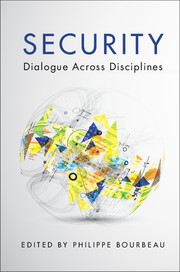Book contents
- Frontmatter
- Contents
- Notes on contributors
- Acknowledgments
- 1 A multidisciplinary dialogue on security
- 2 Philosophy: The concepts of security, fear, liberty, and the state
- 3 Anthropology/ies: Moving beyond disciplinary approaches to security
- 4 Geography: Securing places and spaces of securitization
- 5 Sociology: Security and insecurities
- 6 International relations: Celebrating eclectic dynamism in security studies
- 7 Psychology: The phenomenology of human security
- 8 International political economy: Conceptual affinities and substantive differences with security studies
- 9 Criminology: Reimagining Security
- 10 International law: Between legalism and securitization
- References
- Index
9 - Criminology: Reimagining Security
Published online by Cambridge University Press: 05 December 2015
- Frontmatter
- Contents
- Notes on contributors
- Acknowledgments
- 1 A multidisciplinary dialogue on security
- 2 Philosophy: The concepts of security, fear, liberty, and the state
- 3 Anthropology/ies: Moving beyond disciplinary approaches to security
- 4 Geography: Securing places and spaces of securitization
- 5 Sociology: Security and insecurities
- 6 International relations: Celebrating eclectic dynamism in security studies
- 7 Psychology: The phenomenology of human security
- 8 International political economy: Conceptual affinities and substantive differences with security studies
- 9 Criminology: Reimagining Security
- 10 International law: Between legalism and securitization
- References
- Index
Summary
My point is not that everything is bad, but that everything is dangerous.
(Foucault, in Rabinow 1984, 343)Have you ever read any criminological texts? They are staggering. And I say this out of astonishment, not aggressiveness, because I fail to comprehend how the discourse of criminology has been able to go on at this level. One has the impression that it is of such utility, is needed so urgently and rendered so vital for the working of the system, that it does not even seek a theoretical justification for itself, or even simply a coherent framework. It is entirely utilitarian.
(Foucault 1980, 47)The whole aim of practical politics is to keep the populace alarmed (and hence clamorous to be led to safety), by menacing it with an endless series of hobgoblins, all of them imaginary.
(Mencken 1918, 18)Criminology's most fundamental topic has long been security, understood in Hobbesian terms (Hobbes 1651/1968, 185–186) as interpersonal safety – with the embedded implication of freedom from the fear of interpersonal harms – and the peaceful coexistence that this enables. While the meaning of “security” has varied considerably over time and across disciplines (see the papers in this volume), this core meaning of interpersonal safety and peaceful coexistence, which has recently been the focus of the “new” “human security” (United Nations 1994; Wood and Shearing 2007), has been remarkably consistent within criminology, though, as we will see, the term “security” has not been as prominent as it has been within other areas of inquiry, such as international relations.
Historically, criminology has explored security by focusing its attention on what one might think of as “hitting and taking” harms, typically thought of as “crimes,” that threaten peaceful coexistence along with the governance processes, particularly criminal justice, that have been developed to respond to them. This focus has ensured that individuals have long been at the center of criminological analyses of security. Criminology's crime focus has meant that, while a concern with security, understood as safety, has long been central to criminology, it has been the term “crime,” rather than “security,” that has held pride of place on the criminological stage, as the term “criminology” itself makes clear.
- Type
- Chapter
- Information
- SecurityDialogue across Disciplines, pp. 177 - 195Publisher: Cambridge University PressPrint publication year: 2015
- 7
- Cited by

